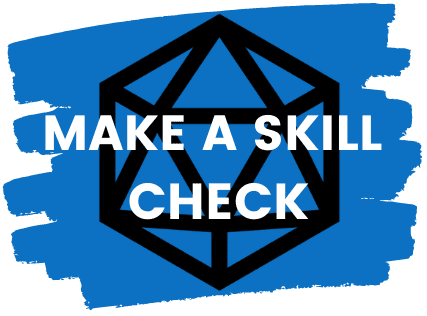In D&D, splitting the party means dividing players into smaller groups to achieve different goals. It can boost the story and efficiency, but should be avoided if it harms group cohesion or overwhelms the DM. DMs can manage splits with balanced encounters, focus shifts, and planning.
Phil Shea
5e Skill Books: When, How, and Whether to Include Them
Skill books can provide short- or long-term benefits, but to avoid power differences between players, it’s best to provide short-term ones with limitations. One book per long rest; bonuses last 24h; avoid numerical bonuses, opting for advantage/proficiency in narrow areas. Read on for more detail.
5e Falling Objects: Damage from Dropping Things Offensively
5e doesn’t have an official framework for damage done by objects falling on creatures—only damage done to the object itself. We propose a system using size category and weight of falling objects, and proposed Str/Dex saves for each. See below.
5e Fire Mechanics: How Much Damage Does NonMagical Fire Do?
RAW, there is no official rules for how mundane fire acts or does damage. Currently, DMs either control the fire narratively or use homebrewed rules. Our suggestion: Embers have 50% to become small fires. Small fires become large after one round. Large fires are more complex. Read on!
D&D 5e: Beginner DM Tips
Start small; develop the world as you go. You should also be enjoying yourself when playing. Take inspiration from everywhere. Don’t bother studying the rulebook; study key basics, then learn as you go. Embrace chaos, stop the game when needed, and adapt the world to the party.
5e: Slow vs Haste
In older editions, there was a clear winner between Slow and Haste. In 5e, however, they are equally useful but in different contexts. Against a group of weak-ish enemies, you want to use Slow to control the battlefield. Against a single foe, Haste is better to maximize your action economy.
5e: Why is Booming Blade Good?
Booming Blade is not great. It fills a niche that makes it a subpar cantrip for most casters, but it has its uses for battlefield control. Best used by melee casters, like eldritch knights, arcane tricksters, artificers, warlocks, etc. Note that it doesn’t allow Extra Attacks for martial classes.
Free Mini-Adventure!
Looking for something to slot into your campaign, ready to go? Here’s a Free Mini-Module to slot into almost any campaign!
5e: How to Become a Lich
Becoming a lich is a dangerous process involving sacrifice, powerful necromancy, and evil pacts to achieve immortality. You must gain access to Imprisonment, find the secrets to crafting a phylactery & a special potion, and then a lot of luck. Even then, you must fuel your immortality forever.
5e Drowning Rules: Underwater Misadventures
While playing D&D, have you ever wanted to explore underwater ruins but were worried about the possibility of drowning? I’ve got explanations for how drowning works in 5e and how to avoid it.










